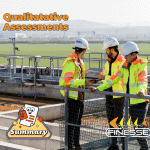
This is the sixth edition of the R for Engineering newsletter, and today we look at the ultimate prioritization tool – Pareto charts!
Pareto charts are a core tool for anyone who makes decisions, whether it is selecting a project or problem to solve, combing through last year’s spend or deciding on what equipment to purchase this year. The list goes on; bottom line is that Pareto charts simply allow you to focus on what’s important and cut through what may be interesting but unimportant.
[Read more…]









